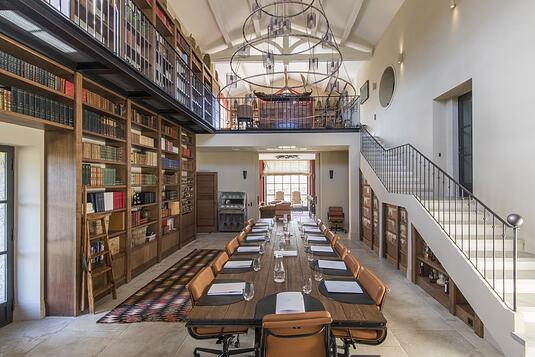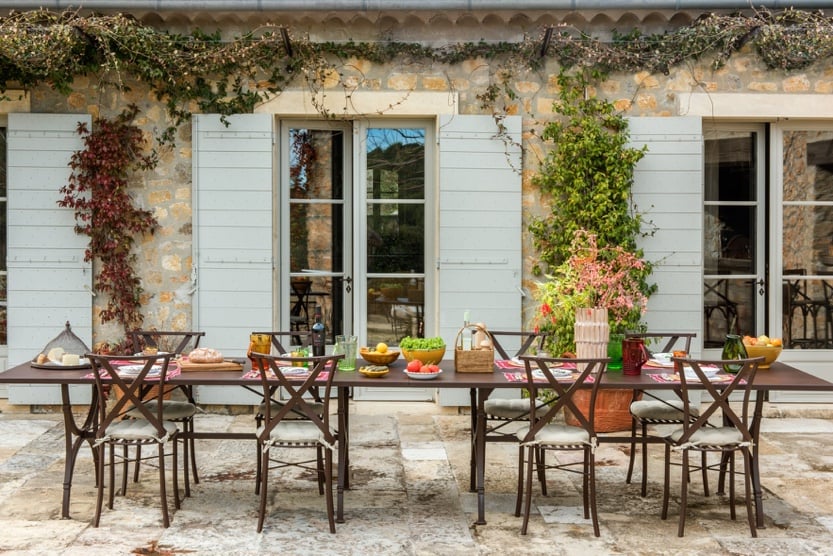The ambience of Château des Imberts will quickly transport you to another time. At the end of its cypress alley, this majestic stone building has watched over the Provençal countryside since the 18th century. Even before passing through the wrought iron gate, we can already hear Marcel Pagnol tell us about his mother's castle. It is a tribute to the traditions of the past that await us within these walls.
Sébastien Pisano, manager of the Bernes estate and its wineries, cut his teeth within the Hilton Group before returning to the South. He sees Château des Imberts as "a green setting in the heart of Provence". Acquired in 2010 by a British family, this property was never available for rent before 2022. Neighbouring the Château de Bernes hotel, these former private apartments were completely renovated in 2015 by Lafoucarde Architecture, an expert firm in the renovation of historic properties. The goal at the centre of this project was to bring its past glory back to life, combining the skills of local craftsmen with a keen sense of decoration.

old glory
To begin this journey through time, you will have to climb to the top of the private tower and see the panoramic views of the estate, overlooking the vegetable garden, olive grove, aromatic garden, farmyard and sheep pasture. Between the garden and the farm, the olive trees cover 175 hectares of the estate, where 100% organic wines are produced. You can learn about wine by visiting the castle's huge library, where high shelves are overflowing with books on the history of wine in Provence, dating back to ancient Rome. Indeed, it is the land surrounding Château des Imberts that is instrumental to its history, since the Bernes park shelters a preserved plot of the Via Aurelia, an ancient Roman road that linked Rome to Arles. On some stones, you can read the date engraved: 1756.
Just like the exterior, the interior of the home is a time capsule, and respecting the past down to the smallest detail is the owner’s motto. A regional centre of activity for more than three centuries, Château des Imberts is also a haven for family life.

ecology and heritage
Perhaps, between paths of the French garden or at the curve of the woodwork, you will find nods to Anglo-Saxon design in this Provençal palace. You will see there is a touch of English humour in the vintage decoration of the Château as you stroll through its corridors and up the stone staircases to appreciate the little touches that make up its unique atmosphere. Hunting boots, straw hats, club chairs, porcelain and tapestries are all just some of the small details that will make you feel like you are stepping back through the centuries. From the grand piano, you can almost hear the scales resonate against the floor tiles when you walk softly on the Persian rugs. The gardens also have their own stories to tell. Above a pond of water lilies, a statue of Pan plays the flute while Daphne watches over the groves, which the gardeners of the residence maintain daily.
Timeless and elegant, Château des Imberts is also sustainable. In a place where traditions are key, ecology is another facet of daily life. In the eyes of Sébastien Pisano, luxury is above all the constant search for perfection, down to the smallest detail. According to him, a real return to basics cannot take place without a more sustainable, calmer way of life. At Château des Imberts, as in the rest of the Bernes estate, plastic is prohibited, recycling is a must, and the service is five stars. Under the guidance of Louis Rameau, a green Michelin star chef, the restaurant Le Jardin des Berne is the salt of the earth. All products are local, and each local producer is known. Nothing goes to waste in his kitchen.

The promise of respite
Provence is known for its lush countryside and beautiful beaches. Perfectly located between shore and fields, Château des Imberts provides access to some of the most beautiful villages in the region. Around the 100 km of hiking trails that run through the Bernes area, the Village of Lorgues and its weekly market is a fabulous display of Provençal scents and local products. Nearby, the Village of Tourtour, nicknamed “the village in the sky”, is one of the most picturesque places in Provence. In Salernes, discover the multitude of pottery workshops and tomette factories before leaving to visit the Gorges du Verdon. Don't forget to stop at Thoronet to see its famous abbey.
While the grounds of Château des Imberts rest during the winter months, Sébastien Pisano confided in us that autumn and spring are undoubtedly his favourite seasons to get lost in the estate. Stay ten days to take advantage of the heated waters of the swimming pool and have a tasting of the wines grown on the grounds. The colours of the castle are never more beautiful than when the weather is mild, so come and experience time standing still in this eternal oasis.
Sébastien Pisano’s Suggestions:
- Le Jardin de Bernes, the Michelin-starred ecological restaurant of the Domaine de Bernes
- The village of Lorgues and its Provençal market every Tuesday
- The village of Tourtour and its picturesque streets
- The village of Salernes for its pottery workshops and its tomette factories
- The village of Moustiers, in the heart of the Verdon Regional Natural Park
- The Maison des Vins Côtes de Provence in Les Arcs for an oenology lesson
- The EuroVelo 8 route which connects the Pyrenean foothills to the Côte d'Azur
Kick off your shoes at Château des Imberts and set off to explore the region as you fall under the spell of the countryside, just a stone's throw from Saint-Tropez.
